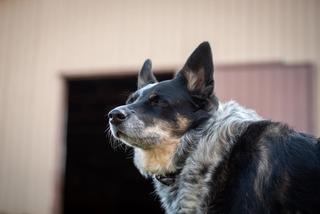How to Keep Your Farm Dog Healthy
Essential Tips for Keeping Ranch Companions Safe & Well-Cared For


The health of your horse's surroundings can have a direct impact on its own health. That's especially true when talking about a horse's favorite companion: farm dogs. Farm dogs can face unique health and safety risks compared to city and indoor-only pets, and an unhealthy farm dog could lead to an unhealthy horse. Keep reading to find out how to keep their companions healthy.
Tick-borne diseases, such as Lyme and leptospirosis, are prevalent among farm dogs and are two of the greatest risks they are up against. Within only 36 hours, an attached tick carrying the Lyme disease bacterium can transmit the disease to its host. With deadly implications, Lyme disease can also cause joint pain and paralysis.
Found worldwide, leptospirosis disease (also known as lepto) is caused by infection with Leptospira bacteria, which are found in contaminated soil and water. Urine from infected wildlife serves as the primary source of infection. As our farm dogs often run through puddles, ponds and creeks, they can be at high risk for lepto.
The Importance of Parasite Control
One of the biggest misconceptions I hear is that farm dogs don’t need flea and tick protection because they don't come into the house. When it comes to tick diseases, it doesn't matter whether they come into the house or not — they're probably the most susceptible to such risks.
Tick-borne diseases can cause severe health issues such as anemia and joint pain, sometimes resulting in lifelong problems, or worse, death. Fleas can also be more than just a nuisance. Severe flea infestations can lead to significant blood loss and energy depletion, hindering them from effectively performing their duties alongside us.
Deworming is equally important; farm dogs eat everything and are more likely to ingest contaminated food or water, leading to issues like tapeworms and overall ill health. It is important to use deworming products labeled for use in dogs. Deworming dogs with products intended for livestock is a dangerous practice and can cause hazardous overdoses.
Additionally, some breeds, like collies, have a genetic sensitivity to ivermectin, a common cattle dewormer. It’s best to avoid this practice altogether and use deworming products designed specifically for dogs to avoid neurotoxicity and other severe health risks.
Heartworms are at the top of the list of dangerous and deadly parasites that can infect our canine friends, causing severe lung disease, congestive heart failure and damage to other organs in the body. Heartworms are spread by infected mosquitoes, and because our ranch dogs spend so much time outdoors, they are highly susceptible to mosquito bites. A monthly heartworm preventative can help protect your dog.
It's essential to keep all of your dogs on monthly preventatives to shield them against ticks, fleas, worms and heartworms.
Vaccination Is Key
Another vital aspect of farm dog health is vaccination. Whether around other dogs or not, farm dogs are at risk of contracting diseases from wildlife like coyotes and raccoons, which can carry rabies and distemper.
Ensuring your dog is vaccinated against common diseases is critical for their health and safety. Consider vaccinating them with a combination vaccine containing parvo, distemper, lepto and Lyme.
Vaccines are cost-effective and a cheap investment that provides a year of protection for your dog, which is an important part of your livelihood and your life.
Take Safety Precautions
With close proximity to chemicals, such as antifreeze and rat poison, and large livestock, it’s important to keep safety in mind for your farm dogs.
Many farmers use rat bait or mouse poison to keep pests at bay, but it's crucial to be cautious with these around your dogs. A dog’s natural curiosity can lead them to sniff and eat these poisons, which could be fatal. Always ensure that any pest control measures are safe and inaccessible to your pets.
When it comes to working livestock with dogs, it’s key to keep in mind your dog’s level of training and any breed-specific tendencies they may have. It’s essential to understand the unique characteristics and training needs of your dog’s breed. For example, heelers are bred to work from behind the livestock, while collies are natural “headers,” keeping the animals between them and the handler.
Proper training is crucial for safety and efficiency, as an untrained dog can cause more harm than help. Training should focus on teaching the dog to understand their role according to their breed’s instincts and abilities.
I’ll never forget an internship experience from vet school, where we managed to spay over 250 heifers with the help of three well-trained border collies. Their owner knew exactly how to work with them, and the dogs performed impeccably, guiding the cattle with minimal human intervention.
Tags:Horse Sense

Acreage Life is part of the Catalyst Communications Network publication family.















